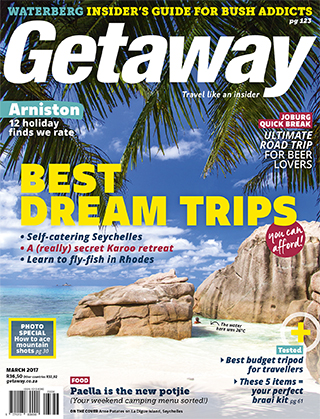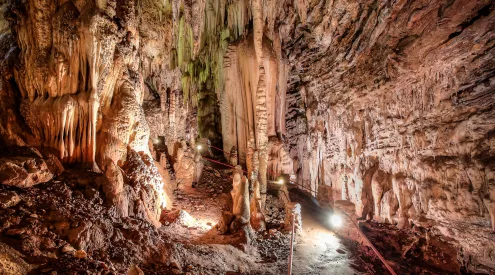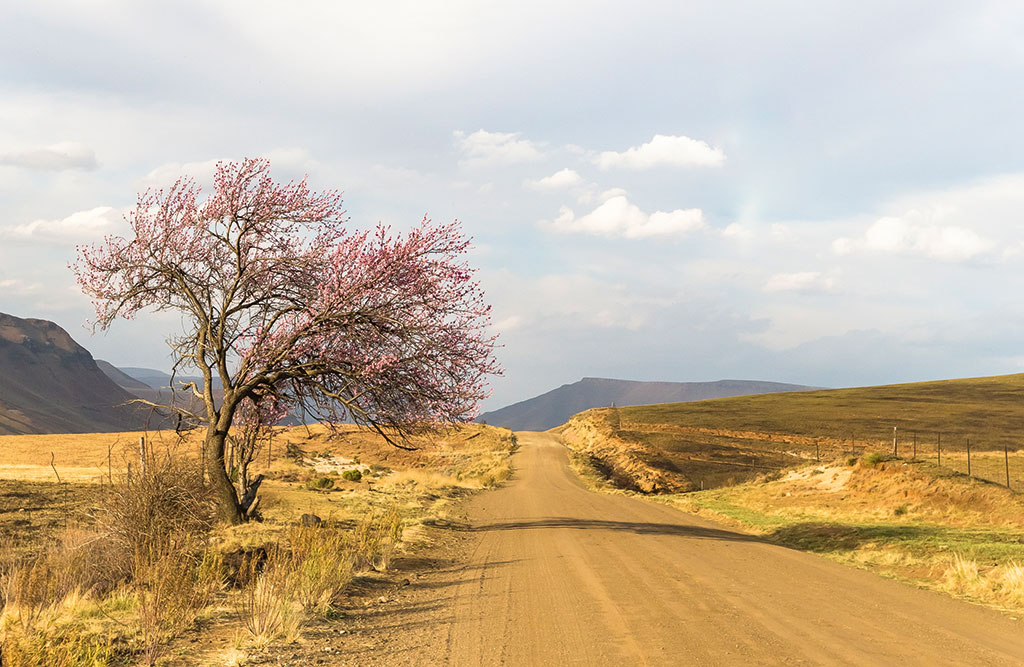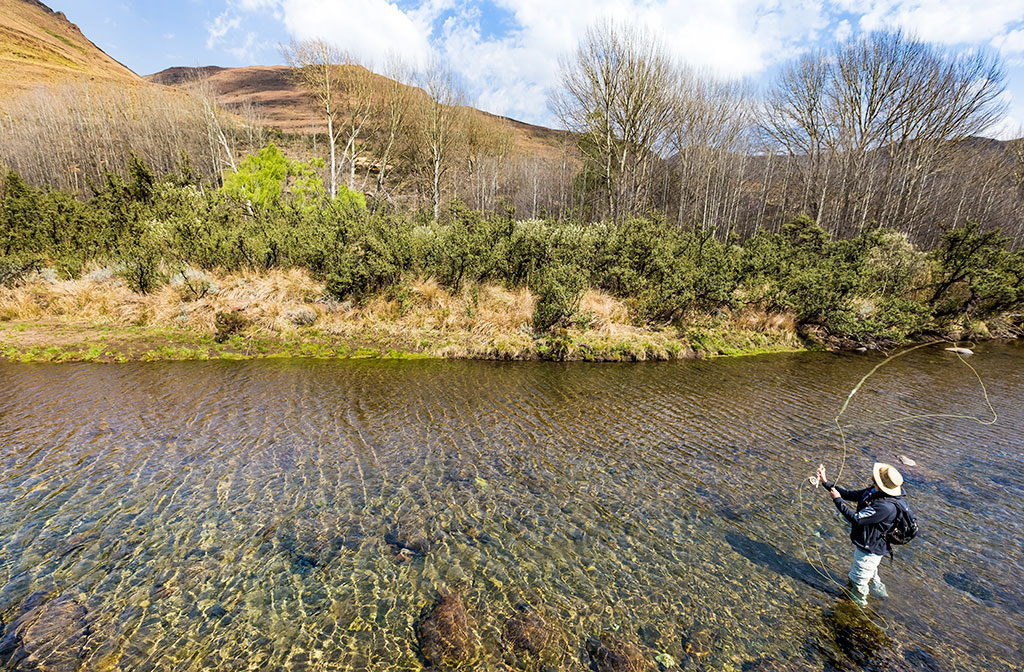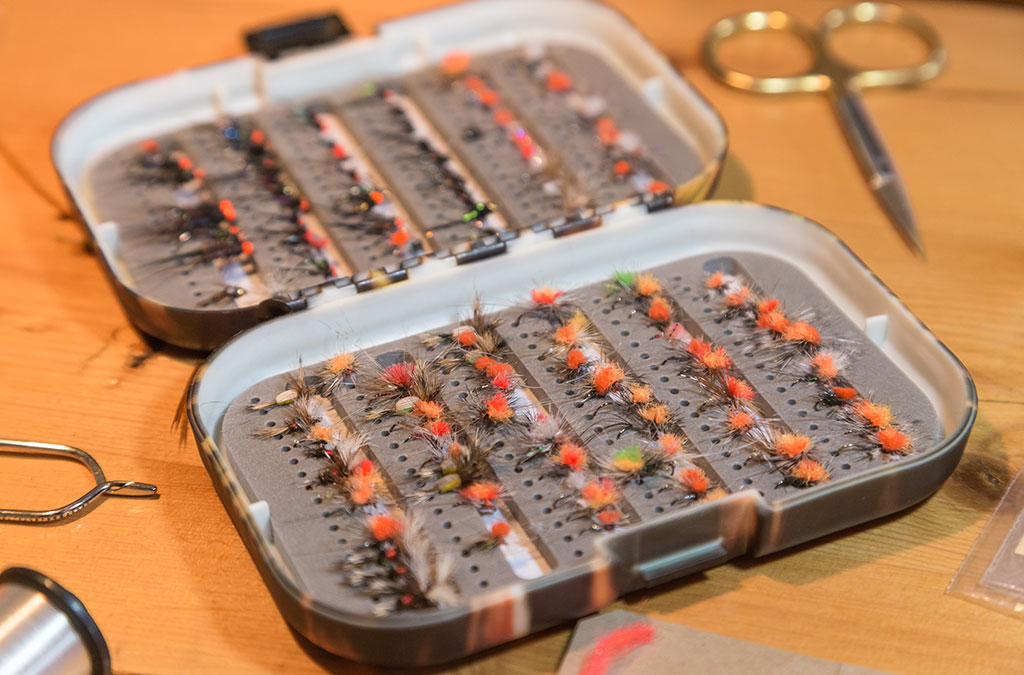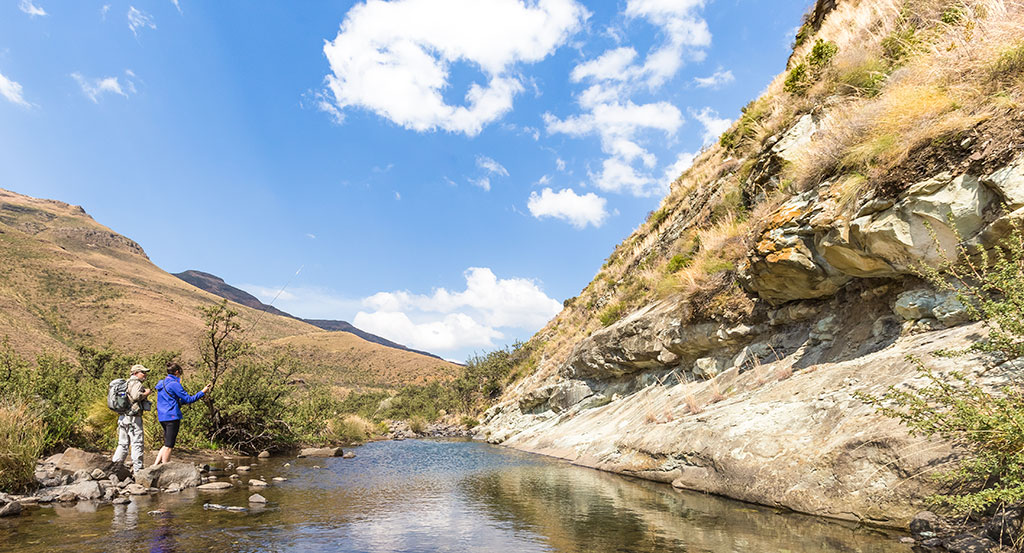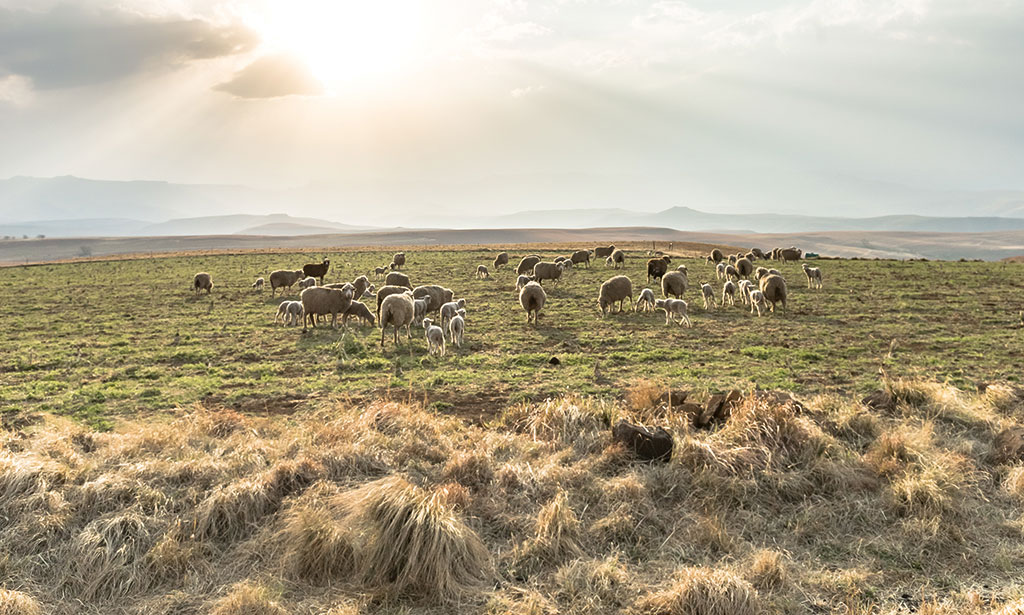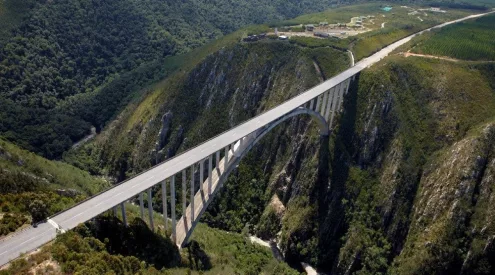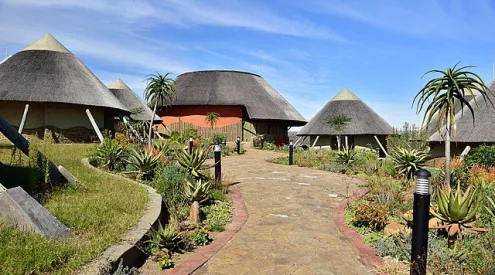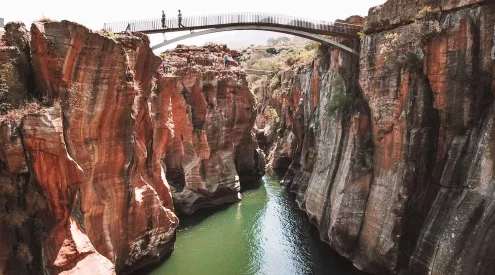Chris Davies discovered one of life’s most pleasurable experiences – fly fishing. Plus there’s no more beautiful place to not catch a fish than in the Eastern Cape Highlands.
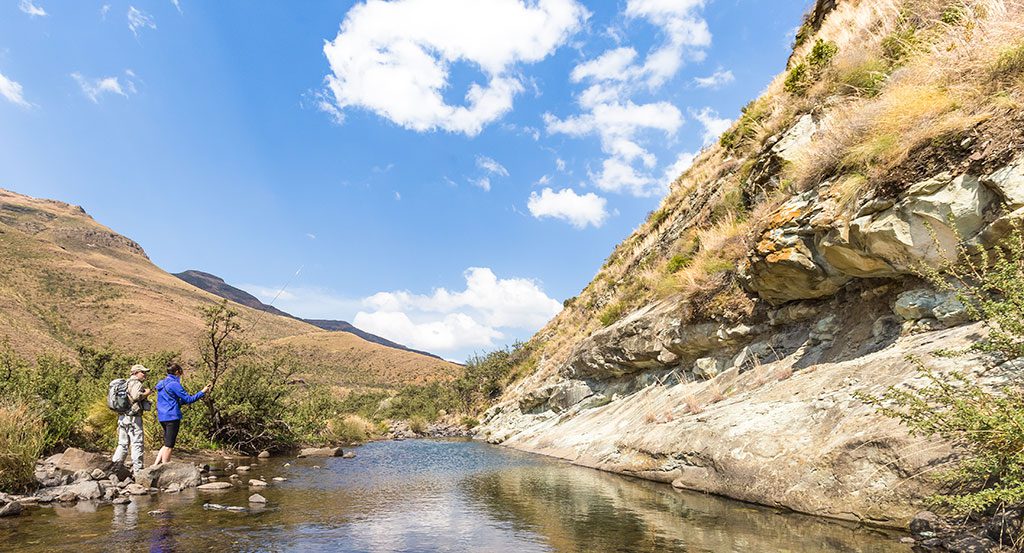
Prospecting a shallow pool along our own stretch of the Bokspruit.
The chilly water climbs past my knees as I inch carefully out into the stream. It moves slowly here, through a long, shallow pool, and the barest of eddies drifts gently behind as I glance down to check my footing. It’s early spring in the Eastern Cape Highlands and cotton-wool clouds hang bright and fluffy over 2500-metre peaks. The Bokspruit is running pure with snowmelt and my waterlogged boots are clearly visible on the stream bed below.
I pause, unfamiliar rod in hand, trying to recall the morning’s torrent of instruction. From the nearby bank my guide and persevering teacher, Fred Steynberg, sees my hesitation and calls out encouragement: Keep your elbow in, don’t throw. Wrist straight. Aim beyond that ‘V’ of moving water.
I cast – an inexpert waft – and line and fly zip by perilously close to my ear. Surprisingly I land more or less on target and remember to lower the rod tip quickly, then slowly take in the slack. My eyes fix on the tiny white fly as it floats on the current towards me. Wait, was that a…

Newborn lambs explore the fields below Naude’s Nek.
‘Strike!’ shouts Fred, and I pull – left hand down, right hand up as he’s taught me – but I’m too slow. The fly jerks but there’s no resistance. The hook is empty as I once again reel my fishless line back in.
I hadn’t known what to expect when I arrived in Rhodes the day before. Dead winter grass covered the mountainsides and pockets of snow still clung to the shadowed heights. Spring had, so far, reached only the rivers, their twisting banks bedecked in bright green ryegrass, weeping willows and newborn lambs.
This is arguably the finest rainbow-trout fishing destination in Southern Africa, for both the fishing and the scenery, but I’d last held a (toy) rod when I was maybe five years old, and in my entire life I’ve never actually caught a fish.
‘It’s a first for me too,’ said Fred when we’d met for the first time that evening. ‘I’ve never guided anyone who’s not even held a fly rod before.’

The paraphernalia of fly tying includes both natural and synthetic materials.
‘Think I’ll catch anything?’ I asked. ‘We call it fishing, not catching,’ he’d replied with a smile. ‘Look, it’s early in the season, and the drought has been tough on the fish population. All we can do is get out there and see.’
Now, back on the riverbank, Fred is striding upstream. That failed attempt has spooked the fish and they won’t go for anything in this pool for a while. I finish reeling in, secure my line and wade back to the bank. With bungling like this I may never land a catch but, although I know Fred very much wants me to, right now it hardly matters.
White pear blossoms dance in the breeze and from behind us a fish eagle calls. It’s a beautiful day in the southern Drakensberg and it seems to me that the trout are just an excuse to be here. With squelching boots and a smile on my face, I set out after Fred, who’s already begun scouting the pool up ahead.
They say fishing is easy to teach and hard to learn, but that undersells what can be imparted by a skilled tutor. Fly fishing in particular is an arcane art, a world of ‘white Wulff wings’ and ‘peacock woolly buggers’ (just two common fly patterns used in the area), and with ever-changing conditions and fish that seem to learn and spurn flies with disconcerting regularity, any edge you can get is an advantage.

My first-ever cast caught on camera (don’t judge).
The basics of cast and strike are not hard to grasp, but mastering the nuances takes patience and skill. It’s one thing to land your fly on a particular piece of water, quite another to know which of the hundreds of flies, nymphs and worm imitations the fish might go for. Fly fishing is in large part trial and error, but if you want to catch, and not just fish, joining someone who’s erred before will certainly maximise your chances.
Fred can’t remember exactly when he started fishing, but thinks it would have been shortly after he arrived in Rhodes in 1980; a 14-year-old moving with his family who for a time ran the village’s only hotel, general store and two-pump fuel station. Becoming a full-time guide in 1993, Fred now takes clients on fresh- and salt-water fly-fishing trips from Cuba to the Seychelles.
I was lucky to catch him in what is still his home town, between back-to-back tours into nearby Lesotho. Having fished all over, he has no doubt that the area around Rhodes is one of the top fly-fishing regions in the world.
‘If you come fishing here for three months I’ll get you on a new stretch of water every day,’ he tells me as we make our way to another promising pool. Yet again, I’d had no luck (or skill) at the last. ‘This is true mountain-stream fishing. It’s as much about being in the environment as it is about the fish.’
I nod in agreement. I may be new to fly fishing but it’s obvious there’s an element of meditation to this piscine obsession:a recognition of the joy in anticipation, of patience and practice, of painstaking repetition and indefinite response. And on these hundreds of kilometres of stream, each fishing permit gives sole access to a specific stretch of water. This section of the Bokspruit was ours for the day – for uninterrupted contemplation on the prospect of fish.
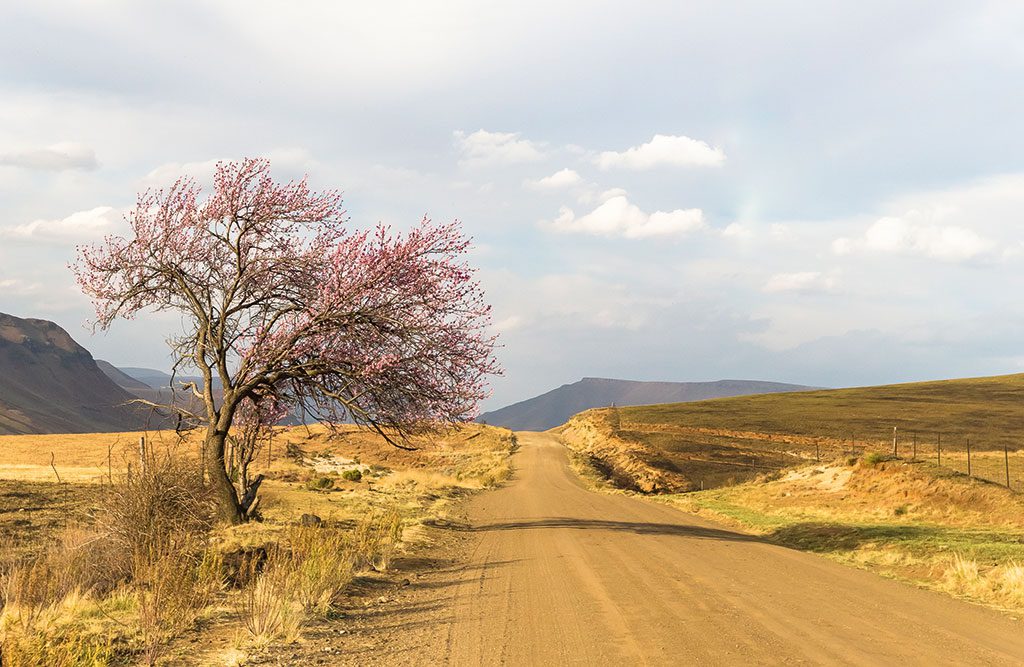
Peach blossoms between Barkly East and Rhodes bring a splash of spring colour to the still-wintery highlands.
Prospecting, however, has no guarantees, and I’m still fishless as the sun starts to dip and we climb up out of the now-steep valley for the long hike back to the car. Back in town we grab a beer and pizza at Walkerbouts Pub, where owner Dave Walker, chairman of the Wild Trout Association is deep in a game of dominoes at the bar.
He and Fred are two of the village’s 25 permanent residents, and the pub is so small you’d struggle to get all 25 in. Fishing caps line the walls and a plaque above Dave’s head proclaims: ‘We are too small to have a village drunk so we take it in turns.’ It’s cosy inside – the kind of place you could spend hours spinning yarns and bemoaning the one that got away.
We bid our farewells and I leave Rhodes the next day, heading east over Naudé’s Nek. At Fred’s suggestion, I’m making one last fishing stop before leaving the Eastern Cape and, after a spectacular two-hour drive, I pull into Vrederus where Donie and Juan-Marie Naudé rear sheep and host fly fishers on their working holiday farm. Their large, shallow dam holds trout, and the surrounding hills gurgle with fishable streams.
Greg Carstens is ensconced in one of the Naudé’s cottages, tying flies when I arrive. Unabashed, I knock, and with what I’m starting to feel is the characteristic hospitality of fishermen, he’s more than happy to invite me fishing the next day.
I rise bright and early and follow Greg along bumpy dirt roads to his chosen morning beat, Bradgate-se-loop, a small mountain stream 45 minutes from the farm. We park, shoulder our packs and set out upstream. A light breeze rustles the willows as his line zips back and forth. There’s not much chat, just cast, pause and move on. Vultures wheel above us and cool, clear water swirls around our feet. I look around, drinking in the scenery, and wait for a strike that never comes.
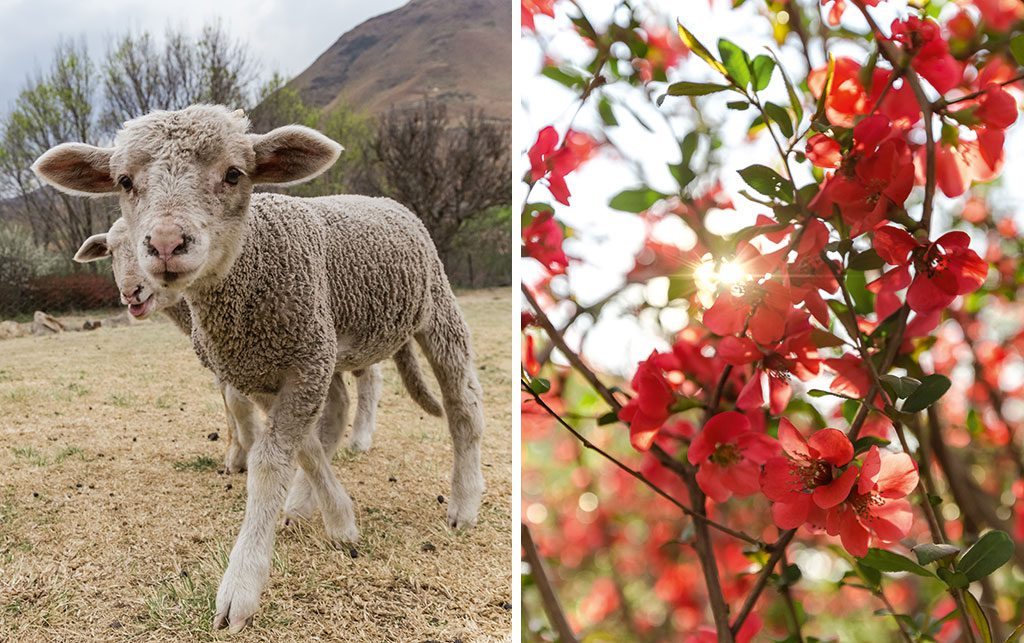
Cute lambs posing for the camera; Flowers adding colour and texture to the wintery landscape.
What it costs
Full-day permits: R150 per person, half-day R80
For beginners: Professional guide Fred Steynberg charges from R1780 per person for a day excursion, including local transport, flies and rods, permits and lunch. He also sells flies (from R8) and rents out rods (R15) from his fly shop in town. linecasters.co.za
Lessons: R480 per person for the one-day Linecasters Beginners Academy on 16 December 2017. R2350 per person for the three-day Advanced Fly Fishing Academy, 14 – 15 September 2017.
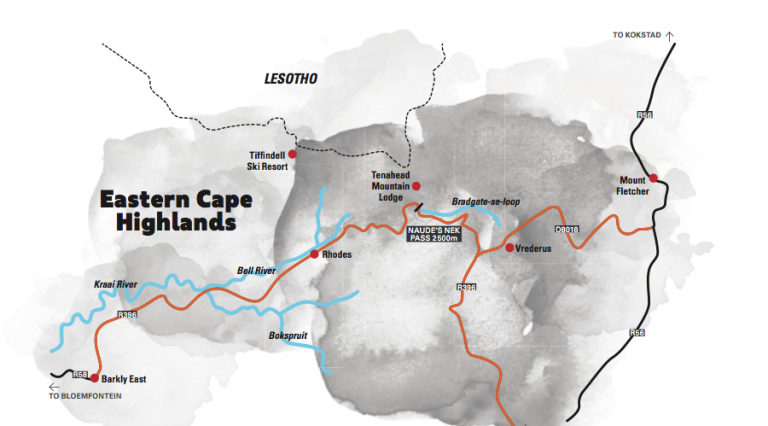
Getting there: Rhodes is seven hours from PE and Durban and eight hours from Joburg. The R396 is a dirt road but sedan-friendly from Barkly East; Naude’s Nek requires high-clearance vehicles. Rhodes has no petrol stations.
When to go: September to mid-May is good for rainbow and (occasional) brown trout, with migrating smallmouth yellowfish in October and November. March and April are the locals’ favourites, when the trout are plentiful and world is resplendent in autumn colours. While droughts are known to reduce fish numbers, they tend to increase individuals’ size – so now’s the time to try for a trophy fish (45 – 60cm long). Early 2017 is showing signs of recovery due to heavy snowfall and good spring rains in 2016.
Need to know: The Eastern Cape Highlands has 300km of streams, strictly fly fishing only, and supports catch and release. Each multi-kilometre ‘beat’ is booked as sole access. Get permits and rods from Linecasters Fly Shop, Walkerbouts (see Stay Here) and Rhodes Info Centre. The climate ranges from -15°C to 35°C and conditions can be extreme any time of year. The nearest doctor is in Barkly East, an hour from Rhodes (0459710285). Get detailed maps and fishing info from the Wild Trout Association.
What to pack: You’ll need waders or wading boots and quick- dry trousers, polarised sunglasses, flies, a net, 2 to5 wt rods and floating lines. Also pack a hat, water bottle, sunblock, rain jacket and a warm top for your fishing outings. Fishing guide Fred can equip up to five people (see box on page 95).
Do this:
Go hiking or riding. Hikers and mountain- bikers can utilise the fly-fishing beat system to access stream paths, and the quiet dirt roads are ideal for both.
Try mountain boarding or grass skiing (R150 per person) out of season at SA’s only ski resort, Tiffindell, 20km from Rhodes. There’s also hiking, off-road motorbiking and MTB trails. No day visitor fee in summer (in winter it’s R65). Skiing season runs from June to August. tiffindell.co.za
Try the local craft beer at Bernie’s Brewery in Rhodes, from R29 a bottle. Open 10am to 3pm (closed on Sundays out of season). Find it on Facebook.
Stay here: Rhodes Cottages has 16 self-catering houses of various sizes in the village. From R500 for two sharing, plus a private farmhouse on the Bokspruit from R1 750 for four (sleeps 10). All are serviced daily. rhodescottages.com
Walkerbouts Country Inn has B&B for R625 per person sharing, six cottages in the village (from R225 per person sharing), and collects the fees for the village campsite: unpowered stands are R65 for two. walkerbouts.co.za
Tenahead Mountain Lodge is a spectacular five-star hotel at the top of Naudé’s Nek pass. From R990 per person sharing B&B. riverhotels.co.za
Vrederus has two beautiful stone cottages: Boatman’s costs R800 for four, Stonefly is R1200 for eight (or R300 per person up to four). vrederus.co.za
This story first appeared in the March 2017 issue of Getaway magazine.
Our March issue features a self-catering trip to the Seychelles that you can afford, a karoo secret retreat, learning to fly-fish in Rhodes and a joburg road trip for beer lovers.
